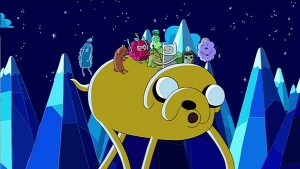[rewind] adventure time vs. avatar: the last airbender
Back when I was around fourteen, I was really into Lost. We still had dialup so I couldn’t Limewire it; I did it old-school, waiting for Christmas when my Grandad would buy me the latest season on DVD. I’d chew up four, five episodes at a time. My little sister, who would have been about nine years old at the time, started sneaking in the odd episode too (we weren’t allowed much TV; marathonning episodes was an act of espionage in my family), and before long she was watching along with me. I remember watching an episode with her where the raft a character has been building for the whole first season is burned. The episode went on to concern itself with solving the mystery of who burned the raft. Well, it needn’t have bothered, because my sister had it figured out as soon as it happened. “The kid did it,” she told me. I looked at her sceptically—if I hadn’t pegged that, how could my baby sister have figured it out? She went on to explain that even though the raft was his desperate father’s last hope to get off the island on which they were stranded, the kid felt at home there, for the first time in his life. She was right: 30 minutes before the writers pulled out their big reveal, a nine-year-old had already figured out the plot twist. Watching Fairly Odd Parents or Dora the Explorer, you don’t see a whole lot of credit being given to the intelligence of their audience, but kids can follow much more complex storytelling than you might expect. Engaging with a good story is a basic human reaction, and kids are no exception to the rule.
While I was watching Lost, my sister was also ahead of the curve on something else: Avatar: The Last Airbender. I dismissed it as kids crap until my 19th birthday when a friend finally sat me down and made me watch the whole awesome, amazing thing from start to finish. The writers of Lost could have learned something about how to make a TV show from Avatar‘s creators. Three seasons of twenty episodes, meticulously planned out, each with its own individual arc as well as being a part of the larger meta-narrative threading the whole show together. From episode one to episode 60 it’s one story. And this is a show that is supposedly aimed at 12-year-olds. It’s also one of the most comprehensive looks at war and its consequences that I’ve ever seen in a TV show, with an incredibly dense mythology and long-term character development whose equal you have to go all the way up the foodchain to big-time cable shows to find. Not to mention badass action sequences, beautiful animation, and oh the romance! The important thing here is that the writers of the show recognised that the key to good children’s television is not different from what makes “adult” TV great. That is why Avatar has a fan base spanning generations, why it has won Peabody awards, and will stand as one of the best animations ever produced. Kids need as much emotional and intellectual meat as we do to keep them entertained.
The show that currently holds the mantle of “that kids cartoon that adults are watching” at the moment is Adventure Time. This is a show that is successful is many ways; it’s entertaining, intelligent, diverse. I think that there’s probably a great deal of common ground between the kids and the grown-ups who enjoy this show, emotionally (watching the last human boy alive singing to his friends in a desperate attempt to keep them together) and comedically (a dog transforming into a farting cheetah). But whenever I’m watching the show there’s always one level of remove for me. I find that I’m often laughing at the fact that this is a kid’s show at all, “like how can they let kids watch this? It’s so existential!” I guess I’m saying that there’s stuff in the show that I wouldn’t expect a nine-year-old to get. When the show switches to a parallel universe in which nuclear war didn’t wipe out humanity, what are the kids thinking who watch it? That it’s funny that the main character looks a bit different this episode? Maybe now it’s me that’s not giving the kids enough credit, but no some fundamental level I feel that the appeal that Adventure Time has for kids and adults is difference. When it’s bad, it just feels like it’s exclusively for kids; aimless storytelling and pretty pictures. When it’s good, it feels like meta-TV, asking you to laugh at the absurdity of the show’s existence. It’s fundamentally a good show, and not nearly as patronising as most other children’s programming out there, but it’s still really about colourful pictures, fun songs, and having a good time. Which is not necessarily a bad thing, but I feel like I want more from it (this is glossing over the times that the show does have good, multiple-episode storytelling, for which it deserves credit, but it’s just not the same as something like Avatar).
My other younger sibling—a brother—was ahead of his time too in his TV habits, getting into The Wire at the age of 12 (when he should have, by rights, been watching Avatar). I know adults that need to watch that show with subtitles, or stop the episode to Wiki the plot to figure out what’s going on. There should be denser, longer, child-oriented TV; they’re definitely ready for it. Bring them up on substantial, engaging storytelling and that’s what they’ll grow to appreciate. Show them flashing lights, and they’ll call 16 and Pregnant their favourite show.
Image Credit (1)


